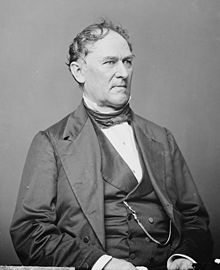Orville Browning | |
|---|---|
 | |
| 9th United States Secretary of the Interior | |
| In office September 1, 1866 – March 4, 1869 | |
| President | Andrew Johnson |
| Preceded by | James Harlan |
| Succeeded by | Jacob Dolson Cox |
| United States Senator from Illinois | |
| In office June 26, 1861 – January 12, 1863 | |
| Appointed by | Richard Yates |
| Preceded by | Stephen A. Douglas |
| Succeeded by | William Richardson |
| Personal details | |
| Born | Orville Hickman Browning February 10, 1806 Cynthiana, Kentucky, U.S. |
| Died | August 10, 1881 (aged 75) Quincy, Illinois, U.S. |
| Political party | Whig (before 1856) Republican (1856–1869) Democratic (1869–1881) |
| Spouse |
Eliza Caldwell (m. 1836) |
| Education | Augusta College |
| Signature | |
| Military service | |
| Allegiance | |
| Branch/service | Illinois Volunteers |
| Battles/wars | Black Hawk War |
Orville Hickman Browning (February 10, 1806 – August 10, 1881) was an attorney in Illinois and a politician who was active in the Whig and Republican Parties. He served as a U.S. Senator and the 9th United States Secretary of the Interior.
Born in Kentucky, and trained as a lawyer, Browning settled in Illinois, where he served in the militia during the Black Hawk War, established himself as a successful attorney, and became involved in politics as a Whig. He served in the Illinois State Senate and the Illinois House of Representatives, and ran unsuccessfully for the United States House of Representatives. When the Whig Party broke apart in the mid-1850s and the Republican Party was formed as the country's major anti-slavery party, Browning took part in the convention that organized the party in Illinois.
In 1861, Browning was appointed to the United States Senate seat left vacant by the death of Stephen A. Douglas; he served until January 1863, after which he resumed practicing law. After the death of Abraham Lincoln, Browning became a supporter of Andrew Johnson; in 1866, Johnson named Browning as U.S. Secretary of the Interior, and Browning served until the end of Johnson's term in March 1869.
After leaving office, Browning practiced law in Washington, DC and Illinois. He was elected as a Democratic candidate for a delegate's position at the 1869-1870 Illinois constitutional convention. He died in Illinois in 1881.